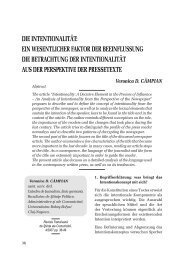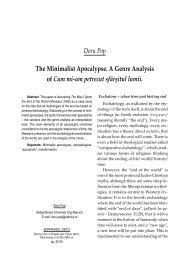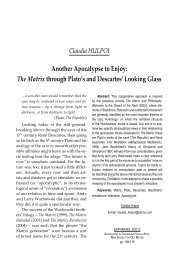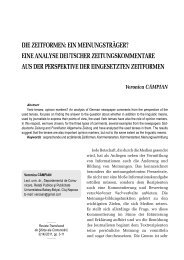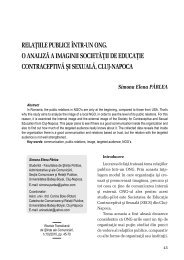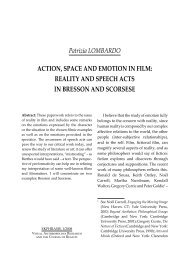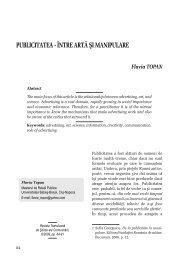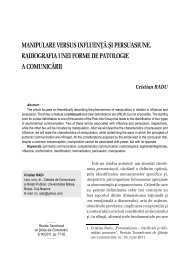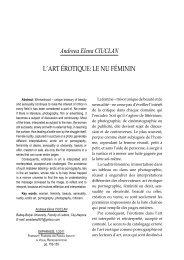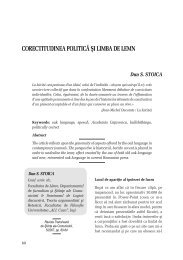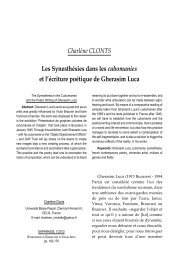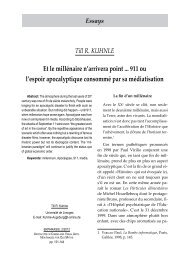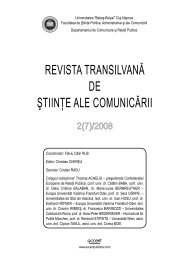East-Central European Proustianism or Synesthetic ... - Ekphrasis
East-Central European Proustianism or Synesthetic ... - Ekphrasis
East-Central European Proustianism or Synesthetic ... - Ekphrasis
Create successful ePaper yourself
Turn your PDF publications into a flip-book with our unique Google optimized e-Paper software.
October, Eight O’Clock – <strong>East</strong>-<strong>Central</strong> <strong>European</strong> <strong>Proustianism</strong><br />
<strong>or</strong> <strong>Synesthetic</strong> Reappropriation of The Real<br />
191<br />
starting at the same point high above,<br />
in front of them. [...] Grandfather did<br />
not take his eyes off the little white<br />
cube of sugar that hung, as usual, from<br />
the ceiling lamp. They all had to stare<br />
at it intensely f<strong>or</strong> some minutes bef<strong>or</strong>e<br />
sipping the hot water. Those who<br />
remembered the taste of sugar, those,<br />
that is, who had had the time, bef<strong>or</strong>e<br />
the disaster, to accustom their palates to<br />
the sweetness of the little white lumps,<br />
gradually felt their lips become wet and<br />
sticky. The brackish green drink become<br />
sweet, good, “real tea”, as Grandfather<br />
would say. [...] Then everyone raised his<br />
eyes toward the lamp from which a tiny<br />
parallelipiped of almost-white sugar<br />
hung on a string. They had to stare at<br />
it patiently f<strong>or</strong> a long time, and had to<br />
sip the tea slowly, until everyone felt<br />
his lips, tongue, mouth, his entire being<br />
refreshed, mellowed by the mem<strong>or</strong>y of<br />
a w<strong>or</strong>ld they must not give up, because,<br />
Grandfather firmly believed, it had not<br />
given them up and could not do without<br />
them. [...] Up there, above the din in<br />
which the po<strong>or</strong> wretches tried, uselessly,<br />
to return to another life, up there, in<br />
an open space, isolated from the huge<br />
waiting room, Grandfather, confident in<br />
a return that would not come to pass,<br />
could have assured them that the magic<br />
potion was indeed proof that the w<strong>or</strong>ld<br />
had welcomed them back. But even this<br />
strange drink did not remotely resemble<br />
“real tea”. (Manea 1992: 30-40)<br />
The analepsis implicitly leads to<br />
the well-known episode from the Old<br />
Testament where Moses, at the command<br />
of God, makes a snake of copper that will<br />
heal any man bitten by a real snake, if he<br />
beholds the brass figure. The context is<br />
represented by the conflict between God<br />
and the People of Israel, discontented<br />
with the rough desert. Both cynical<br />
and compassionate, Yahweh plans a<br />
punishment symbolically consubstantial<br />
with the rescue. Like the brass snake,<br />
which had to remind the chosen rebels<br />
about the infallible attributes of God, the<br />
small piece of sugar hung by the lamp<br />
represents the guarantee f<strong>or</strong> another<br />
reality, one that is w<strong>or</strong>th living f<strong>or</strong>. When<br />
any springs of humanity are threatened,<br />
the reclaiming of a lost taste acquires the<br />
significance of a crucial stage in saving<br />
one’s own existence.<br />
Representing a step f<strong>or</strong>ward as compared<br />
to the expl<strong>or</strong>ation of a peaceless<br />
self from The Sweater, where the child,<br />
witnessing unannounced deaths, is<br />
waiting f<strong>or</strong> the tragic finale, Proust’s<br />
Tea describes the traumatic p<strong>or</strong>trait of<br />
the first years of living only after the<br />
recovering of sensitivity and, of course,<br />
of the necessary distance f<strong>or</strong> autoscopy:<br />
“If, later, I lost anything, it was precisely<br />
the cruelty of indifference. But only later;<br />
and with difficulty. Because, much later,<br />
I became what is called … a feeling being<br />
(Manea 1992: 41).<br />
In a discussion about October, Eight<br />
O’Clock, Manea says that he tried to<br />
imagine Proust in Transnistria. Except<br />
that now, the grandfather’s ritual and<br />
the mother’s protection are no longer<br />
touching, but they represent desperate<br />
eff<strong>or</strong>ts to simulate the altered sen-




